This Redditor's Mom Gets Furious When She Finds Out Her Dog Gave Birth On Her Fancy And Pricey Bed
The Chihuahua breed is well-known for being small and delicate, especially given its active and lively nature. When giving birth, the potential for damage is higher than that of an ordinary dog, and handling the pups requires extra care and attention.
It's critical to have specific items on hand to help both the infants and the mother navigate this phase. A whelping box, which is essential for all puppy births, is one of these items. It's simply a pen where the mother may relax before, during, and after whelping.
A washing basket with a heating pad and blanket inside is also necessary for the newborn puppies. Be sure to monitor the temperature closely.
If the puppies become too hot, they will cry, and if they become too cold, they will whimper. Additionally, keep a stock of clean towels, emergency supplies, sterile scissors, rubber gloves, antiseptic solution, and thick thread or dental floss in case umbilical cords need to be tied.
Furthermore, have the phone numbers for your regular veterinarian and an after-hours animal emergency facility readily available, as most whelping occurs in the early morning. Remember that multiple deliveries (including breech births) are common with dogs, so the initial pup will be followed by others.
Count your dog's nipples to get an indication of how many puppies to expect; typically, that is the maximum number of puppies in a litter. If the mother continues to experience contractions for more than two hours without giving birth to another puppy, contact your veterinarian immediately.
OP turned to Reddit when her mom's dog, a Chihuahua, gave birth on the princess bed.

OP showed this item where the dog was supposed to give birth, explaining it was the same thing they used for their cat.
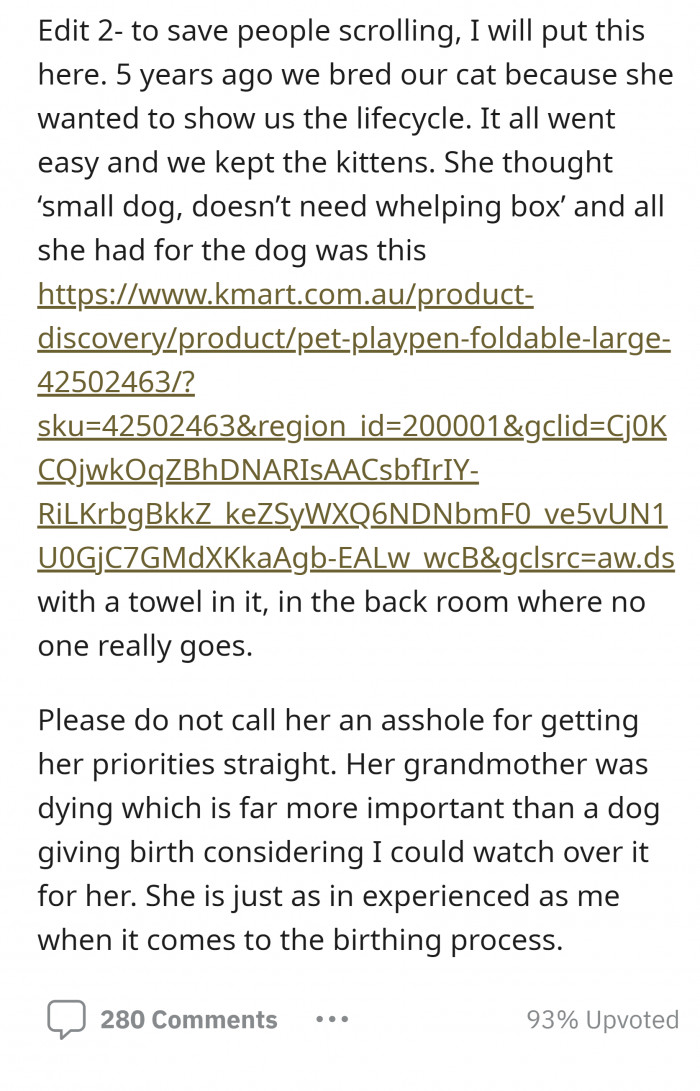
The pet playpen.

Identifying Emotional Responses
Dr. Sarah Thompson, an expert in family psychology, notes that emotional responses to pets can vary significantly based on personal values and attachment styles.
Some individuals may prioritize material possessions, while others may place a higher value on emotional connections with their pets, leading to potential clashes.
This highlights the importance of understanding individual perspectives in family dynamics.
The Value of Pets in Family Dynamics
Pets often play a significant role in family dynamics, acting as sources of comfort and joy. However, when a pet's behavior disrupts household harmony, it can lead to emotional turmoil. Research from the American Psychological Association indicates that attachment to pets can complicate human relationships, especially when expectations around responsibilities are misaligned.
Understanding the emotional bonds people form with pets can help clarify the reactions observed in this scenario. It is essential to balance the needs of the pet with the household’s environment, ensuring that both are respected.
#1 "Dogs need to nest prior to birth."
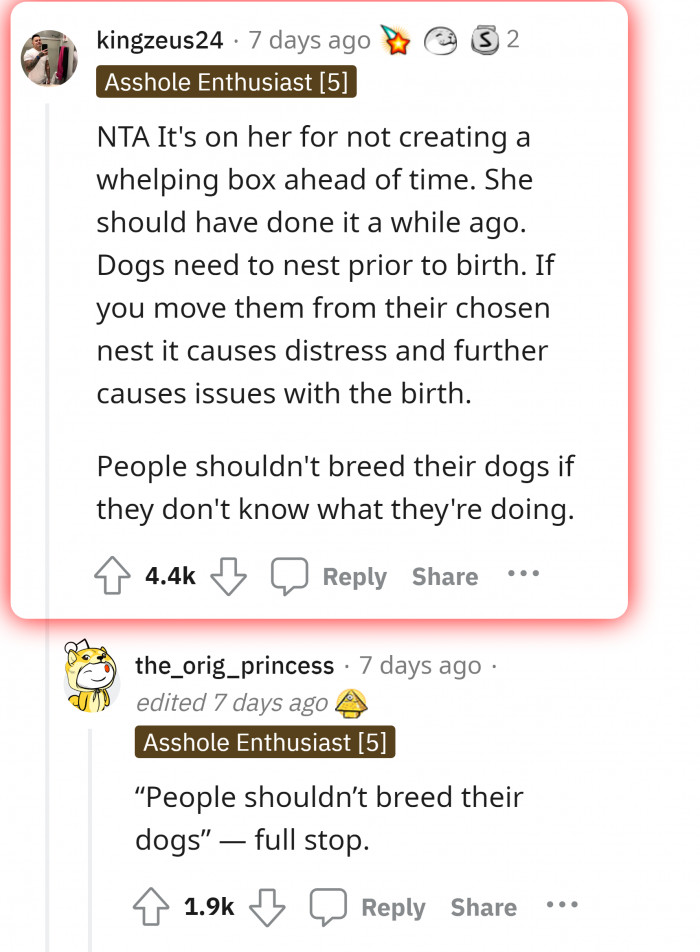
#2 Animal life versus expensive furniture.

#3 Mother's instinct.
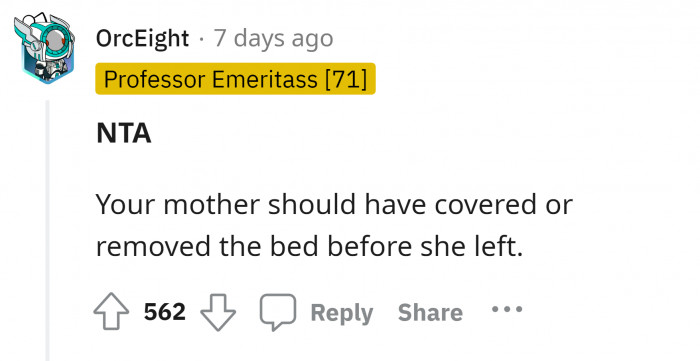
Studies show that attachment styles formed in childhood can significantly influence adult relationships, including those with pets.
For example, individuals with secure attachment styles may navigate these conflicts with more understanding and empathy.
In contrast, those with anxious or avoidant styles may react more defensively when their values are challenged.
Behavioral psychologists emphasize the importance of understanding the motivations behind pet ownership. For some individuals, pets represent love and companionship, while for others, they may symbolize status or material investment. This divergence in perception can lead to conflicts, especially when unexpected situations arise.
To bridge this gap, it is crucial for family members to discuss their expectations regarding pet care openly. Establishing a shared understanding of both the emotional and practical implications of pet ownership can help prevent conflicts in the future.
#4 The level of comfort given to the birthing dog.

#5 Expensive furniture as the dog's birthing nest.
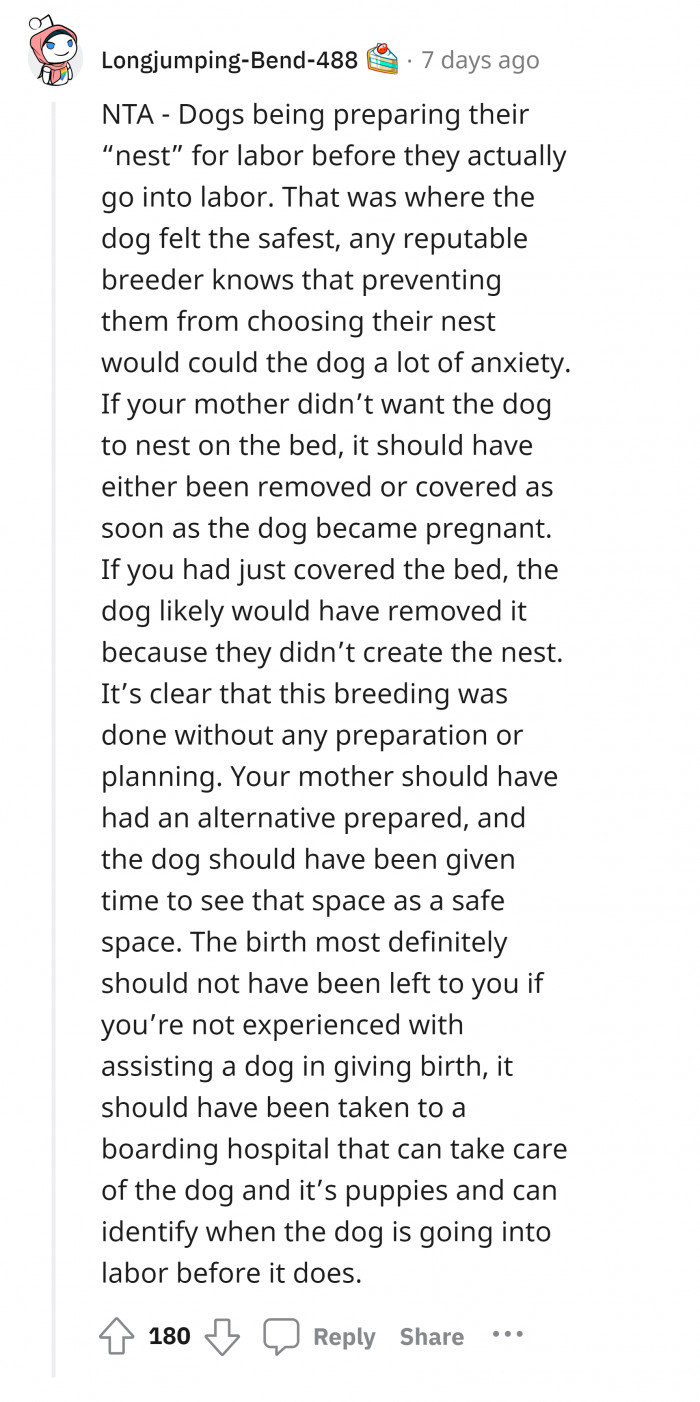
#6 Mother as the dog breeder.
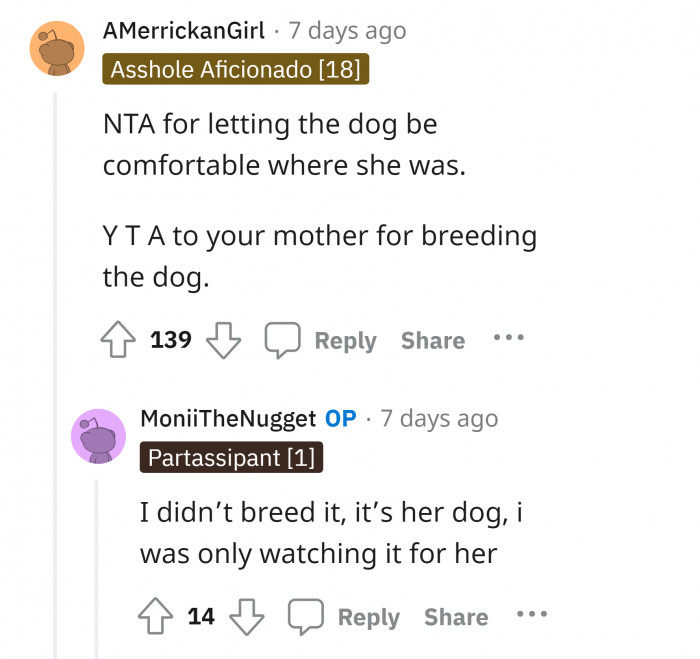
Finding Common Ground
To resolve conflicts around pet care and property, experts suggest engaging in empathetic discussions to identify shared values.
Creating a compromise where both the dog's comfort and the owner's values are respected can foster a collaborative approach.
Regular family meetings can help address ongoing concerns and prevent future misunderstandings.
Coping with Disappointment and Anger
The emotional response of anger, especially in reaction to perceived violations of personal space or property, is a common psychological phenomenon. According to research published in the Journal of Personality and Social Psychology, anger can often arise from feelings of helplessness or frustration when our expectations are not met.
To manage such emotions effectively, it is essential to recognize the triggers and practice self-regulation. Techniques such as deep breathing, cognitive reframing, and focusing on problem-solving rather than blame can help individuals navigate their feelings more constructively.
#7 "Thank you, mother" - Dog
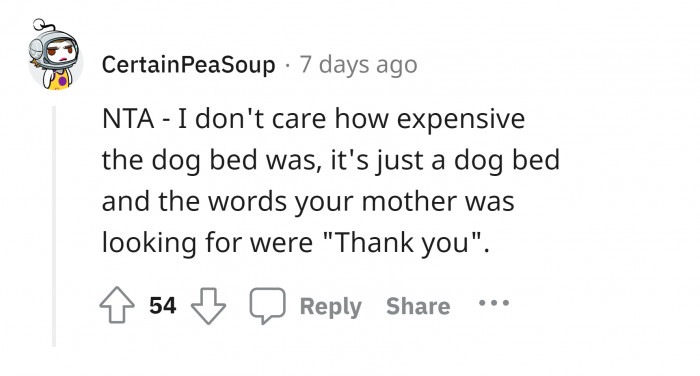
#8 "But your mother is."
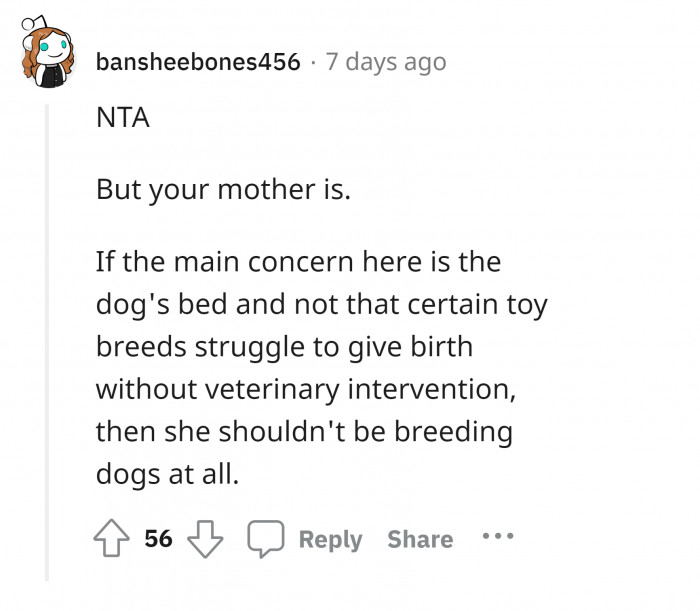
#9 Puppies open for adoption.

Conflict resolution research emphasizes the importance of recognizing underlying emotional triggers during disputes.
Addressing these emotions directly can lead to more constructive conversations and reduced animosity.
Understanding the root of one's feelings about material possessions versus emotional attachments is crucial for effective resolution.
In this scenario, the conflict between valuing the dog’s comfort and the mother’s attachment to her possessions illustrates a classic clash of values. Social psychologists have shown that clashing values can lead to misunderstandings and increased conflict. Understanding and respecting each other's values can help mitigate these tensions.
Encouraging open dialogue about what is most important to each party can foster empathy and lead to more productive conversations about pet care and boundaries.
#10 "Who leaves the dog close to birth with someone else to deal with?"

#11 Neutering as prevention.
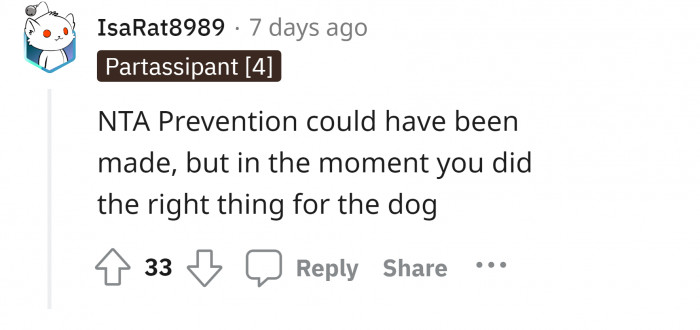
#12 Lacking instruction and not enough knowledge for the birthing process for Minnie.
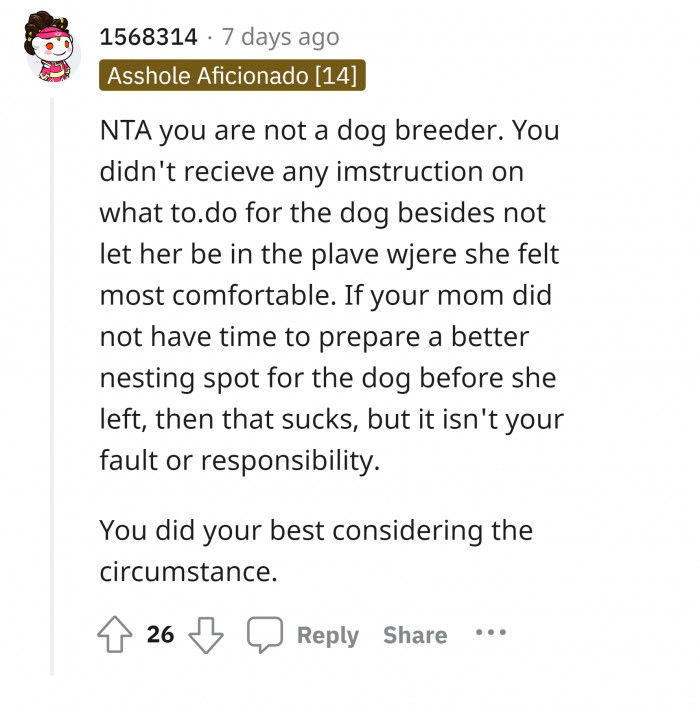
The Consequences of Poor Communication
Psychologists warn that failing to communicate effectively can lead to growing resentment and heightened tensions within households.
In many cases, unresolved conflicts over pets can escalate into larger relational issues, impacting overall family harmony.
Addressing these issues promptly and openly can help maintain healthy relationships and emotional well-being.
#13 My mother's little princess.
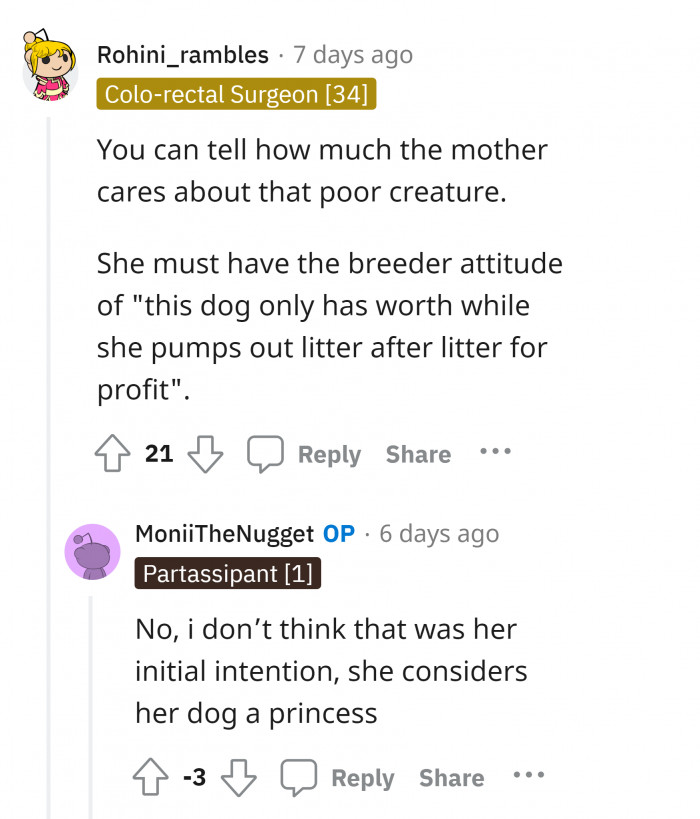
#14 Peroxide for blood stains.

#15 The responsibility of a breeder.
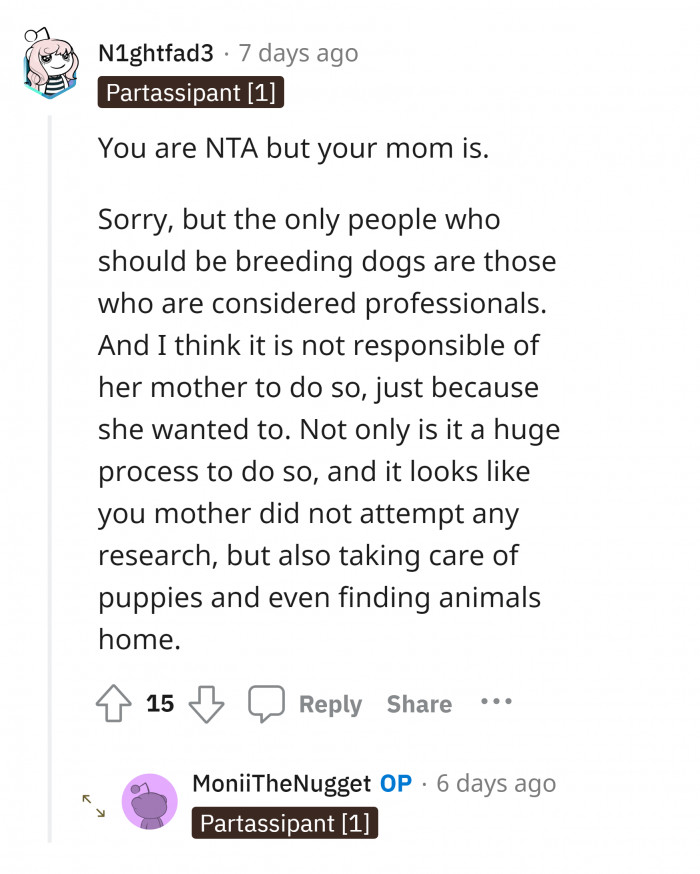
#16 "Breeding the dog."

#17 The risks that the mother and her puppies can potentially face.
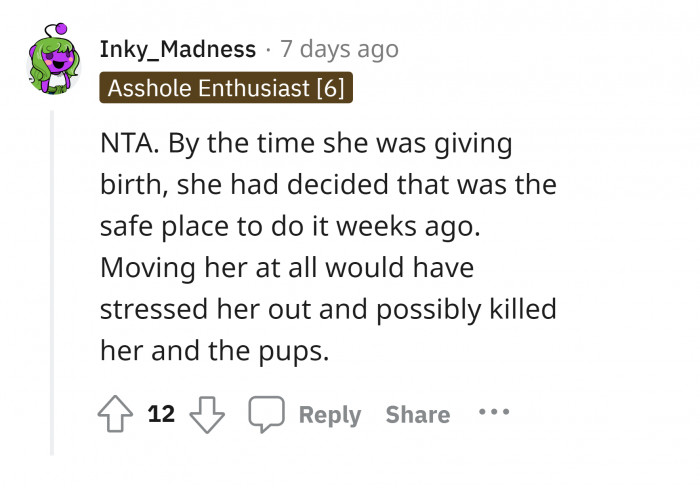
#18 Preparation for the possibilities, before and after.
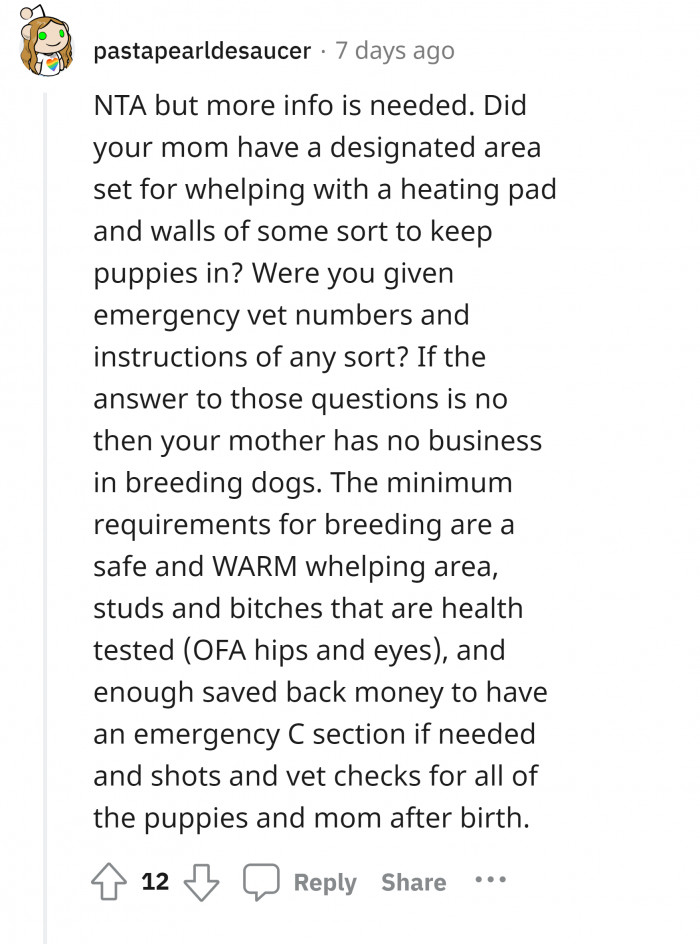
#19 Seeking veterinarian intervention.
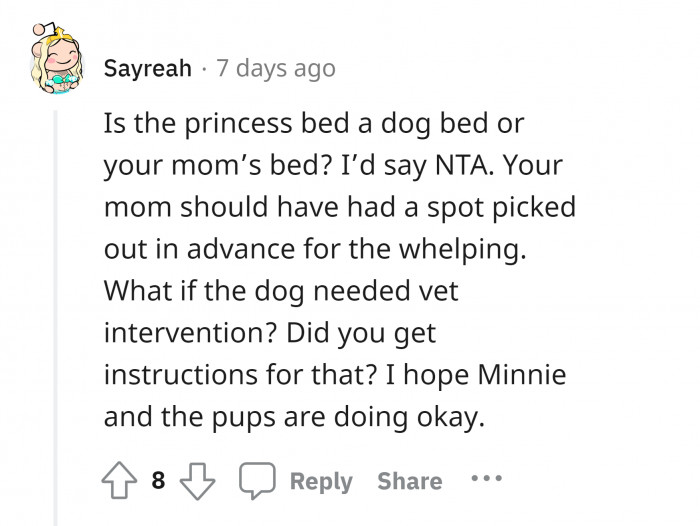
#20 Knowing more about breeding dogs and delivering puppies.

People who intend to breed their dogs should educate themselves before doing so. Dogs giving birth need extra care and precaution from their owners, and it is advisable to seek guidance from veterinarians if you have no idea what to do.
There are things that you should prepare, steps that you should take, and signs that you might want to watch for to ensure the safety of your dog and her puppies.
Psychological Analysis
This situation encapsulates the emotional complexities of pet ownership within family dynamics. When expectations clash, it's easy for frustration to escalate. From a psychological standpoint, fostering open conversations about values and responsibilities is essential for maintaining harmony in such relationships.
Analysis generated by AI
Analysis & Alternative Approaches
In conclusion, navigating pet ownership within family dynamics requires open communication and an understanding of emotional investments. Research suggests that acknowledging and respecting differing values can lead to healthier relationships and more harmonious living situations. By fostering an empathetic approach, families can better manage the complexities of pet ownership while maintaining a positive home environment.
Analysis & Alternative Approaches
Understanding the psychological aspects of attachment and values can significantly improve family dynamics.
As research shows, addressing conflicts proactively, with empathy and communication, is essential for maintaining harmony.
Ultimately, fostering understanding and cooperation around shared responsibilities can lead to healthier relationships within the home.



